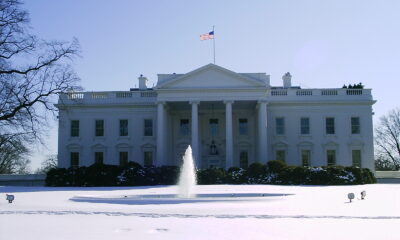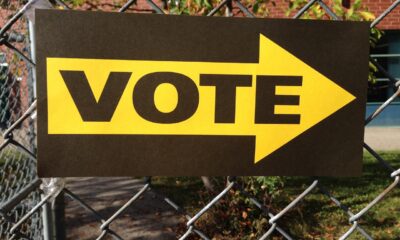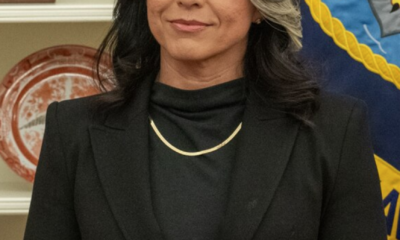Constitution
Absentee voting – how NOT to facilitate it
Racine, Wisconsin’s use of a Mobile Voting Precinct illustrates how NOT to facilitate absentee voting. There’s a right way and a wrong way.
2024 could be the year of straightening out voting rules, if Republicans continue to fight for good rules in court. On Monday (January 8), the Circuit Court of Racine, Wisconsin ruled against a novel form to facilitate absentee voting. Specifically, the court held that mobile voting precincts were not legally authorized, and that if any county or city wanted to use them, the Wisconsin legislature must specifically legislate them. CNAV proposed a mobile voting precinct to handle the “hard cases” of voters who could not vote in person. But the tale in Racine involves abuses that made it no more secure than an unattended drop box. Herewith the details on how the Racine, Wisconsin City Clerk’s office actually used a mobile voting precinct, differs drastically from how a county or municipal clerk or board of elections should use it.
Absentee voting – what’s the problem?
Absentee voting means any way to cast a ballot on behalf of a voter who cannot – or would rather not – appear in person, on the appointed Election Day, to cast a ballot. Unfortunately, in the United States today the usual absentee voting method is to let a voter mail his ballot in. This is an open invitation to fraud – for how is even a good-hearted Officer of Election to know whether the person filling out, signing, and returning an absentee ballot, the same as the person lawfully registered to vote? Signatures are notoriously subject to forgery. Processing large numbers of absentee ballots can delay an election for days, or else must proceed without effective signature verification.
This has caused many activists, concerned for election integrity, to abolish absentee voting altogether. But this creates another problem. Voters find themselves unable to vote in person on Election Day for various reasons. Persons in military service might be deployed elsewhere on Election Day. Business conferences often do not suspend in Election Season. OOEs assigned out-of-precinct either vote early or not at all. And, of course, people fall ill. Unfortunately, some activists’ reply to such hard cases is, “How often does that happen?” Which means “Tough [fornicating] luck!” But “Tough [fornicating] luck” will never stand up in court. Among other reasons for this, the French, which have their own unique method of handling absentee voting, report that seven percent of votes cast use that method. Disenfranchising seven percent of voters can never be acceptable.
The Mobile Voting Precinct
CNAV proposed the Mobile Voting Precinct two years ago. CNAV intended this to address the hard cases without allowing the bedlam that is early or mail-in absentee voting today. To review:
The Mobile Voting Precinct, as CNAV proposed it, was to have the following staff:
- Driver and driver’s mate, who would have charge of the physical safety of all other staff on the road.
- Security officer, in charge of physical security at any stop.
- Sanitation officer, to sanitize equipment against infectious agents.
- Chief Officer of Election (or Election Judge), who makes final decisions on balloting, provisional ballots, and so on.
- Assistant Chief Officer of Election (or Election Inspector): an Officer of Election from the opposite Party to the Chief.
- A number of Officers of Election sufficient to carry out the functions of a precinct. Some of these could function as Security and Sanitation officers. Chief and Assistant Chief could function as driver and driver’s mate.
All personnel for the mobile voting precinct would take an oath of office as Officers of Election. The total staff might be less than the number of positions listed above.
The MVP would carry all the equipment a conventional precinct carries, including voting booths, ballots, scanners, signs, etc.
Dispatching the mobile voting precinct
This vehicle would not dispatch regularly, but only upon specific voter request. It might also dispatch to any institution or installation where one would expect to find many transportation-impaired voters in one place. The obvious candidates include:
- Long-term care homes. These go by names like “nursing home,” “assisted living community,” and the like.
- Hospitals. Hospital staff would have one of the priorities for in-person early voting. Hospital patients, however, can’t always plan such things ahead of time. The mobile voting precinct exists to serve them.
- In-patient physical medicine and rehabilitation centers. The same considerations apply.
In addition, a much smaller version (say, a crossover vehicle), perhaps with driver and driver’s mate (of opposite Parties), could visit a shut-in voter at home. A “mid-sized” version could visit any apartment complex where several voters need the mobile voting precinct to visit them. Voters would pre-apply for this service, instead of applying for mail-in absentee ballots as they do today.
Poll watchers and reporting
Accredited poll watchers would have two choices, depending on the type of dispatch. They could either:
- Meet the mobile voting precinct at its destination (typically the long-term care home, hospital, rehab, or apartment complex), or
- Ride around in it, especially if the registrar dispatches it to go door-to-door to voters’ single-family houses.
Today Chief Officers of Election report vote totals after closing. Chief Officers of Election for mobile voting precincts would do the same, and on the same channel: their personal cellphone. Poll watchers would of course stand by, with a copy of the scanner tape. (One other necessary reform might involve including the poll watcher on the reporting call, in conference-call mode.)
How Racine, Wisconsin actually handled absentee voting
But that is not how Racine, Wisconsin used its mobile voting precinct for absentee balloting, according to the challenging lawsuit. According to the Associated Press (via WXIN-TV, Channel 59, Fox Broadcasting Network, Indianapolis, Ind.), Racine officials abused the MVP. Specifically:
The Racine City Clerk sent the MVP to Democratic neighborhoods only, as a regular service. What’s more, they used it to collect ballots, and to take all comers, not those who pre-applied for the service.
According to Jim Hoft at The Gateway Pundit, the MVP never dealt with any Party-accredited poll watchers. That puts the process out of the view of parties interested in the election outcome.
Republicans grew suspicious when they found that the city of Racine ordered a custom-built panel van as an MVP. They paid for it with a $222,045 grant from the Center for Technology and Civic Life. Which is Mark Zuckerberg’s operation – Zuckerbucks!
Ground News gave more information on the improper use of this concept:
The vehicle could be used as an early voting location or voter registration booth in different predetermined locations throughout the year. The purchase for the vehicle was approved in August 2020 for up to $250,000. It is being paid for through the city’s grant from the Center for Tech and Civic Life. CTCL is the nonprofit that received more than $300 million donation from Facebook Founder Mark Zuckerberg.
Again: the Clerk of Elections should dispatch a Mobile Voting Precinct only upon request, to a voter’s home, long-term care home, hospital, or PM&R center. Instead the city was dispatching it to prearranged locations – and not even offering to coordinate with poll watchers.
The court says, no more
Racine County Circuit Judge Eugene Gasiorkiewicz (gah-SYOHR-key-witch) permanently enjoined the use of Racine’s MVP. In his ruling, he said:
Nowhere can this Court find or has been provided any authority allowing the use of a van or vehicle as an alternate absentee voting vehicle.
Just because the law did not specifically disallow an MVP, did not automatically allow it. If Racine or any other Wisconsin city wants to use a Mobile Voting Precinct, let the legislature pass a law. Until then, no. The Wisconsin Elections Commission and Wisconsin Department of Justice won’t say whether they will appeal.
This case came to national attention because Elon Musk, new owner of X, had reason to weigh in on it. A liberal journalist named Judd Legum dropped an angry thread about some of Musk’s recent posts about elections. Specifically, Musk charged that non-citizens were permitted to vote. Judd Legum disputed that:
More accurately, perhaps, the enforcement against non-citizen voting in federal elections is lax. That’s because current case law does not permit a State to demand proof of citizenship for voting in federal elections. So Arizona is issuing “federal-only” ballots. Musk did not mention, but perhaps should have, that this violates the Elections Clause of the Constitution. It is taking “time, place and manner” of electing Senators and Representatives out of State legislative hands.
Professor Yann LeCun of New York University scornfully suggested that a “properly-run site” would censor election information.
Given Elon Musk’s struggle to fight against the “stakeholder capitalism” of advertisers, that remark was like hanging a red flag in front of a bull. Elon Musk responded thus:
How else to handle absentee voting?
Needless to say, more than half the replies to Elon Musk’s post above mentioned:
- The irregularities in the Election of 2020 and how the Democrats profited from them (even if not down-ticket), and
- Facebook’s complicity therein.
In any event, this exchange has called more attention to the absentee voting problem. Clearly the government of Racine, wishing to stay Democratic, acted in bad faith. How they used their MVP, is equivalent to not running a voting precinct in a Republican area at all. But Republicans must argue in good faith, too. Telling people they get only one shot at voting, and if circumstances do not permit them to vote, “tough [fornicating] luck,” will likely persuade a court to rule for the opposite extreme.
The French, as mentioned, have another solution. Any voter, anticipating a problem with showing up on Election Day, may pre-register, together with someone they trust to vote on their behalf, with a local law-enforcement precinct or municipal court. If a voter is too homebound or bedridden even for that, an LEO or court officer can come to them. A proxy can vote for one other voter.Officers of Election by definition rate special consideration. Any Clerk of Elections should be able to design a system to accommodate OOEs assigned to “foreign” precincts. In theory, the Clerk “knows” the OOEs better than any other voters.
Absentee voting in the military
The military today relies on federal Voting Assistance Officers – who are not always in the military! This is not secure. The best outfits to handle military absentee voting would be the respective uniformed law-enforcement arms of the different services. The only other way to handle military absentee voting is to abolish it altogether. But that evokes memories of the allegations against President Abraham Lincoln about his conduct of the Election of 1864.
The [Lincoln] Administration … had made a doubtful play for the soldier vote, allowing voting only in units where Republican sentiment was strong. Voting by voice made it difficult for soldiers in the field to oppose the general will. On the home front, military units were stationed in areas of strong peace sentiment to discourage Democrats from voting. Blum JM, Morgan ES, Rose WL, Schlesinger AM, Stampp KM, and Woodward CV. The National Experience: A History of the United States, 3rd ed. New York: Harcourt Brace Jovanovich, 1973, p. 353.
Of course modern Democrats dare not complain about that, because Democrats in that election voted as they did from racism. But those interested in election integrity must avoid even the appearance of such manipulation.
Republicans in Wisconsin have two choices in the likely appeal. They can oppose Mobile Voting Precincts altogether, or propose the kind of policies listed here. Or they can examine the French proxy registration system. Present systems operate with no chain of custody – and when 17 percent of voters surveyed admit to fraudulent activities, that becomes unacceptable. Furthermore the sensitivity of the left to Elon Musk’s criticisms of lax election policies signals a clear intent to cheat. Republicans have an imperative to take all necessary measures to prevent this. That demonstrably requires getting control of absentee voting.
Terry A. Hurlbut has been a student of politics, philosophy, and science for more than 35 years. He is a graduate of Yale College and has served as a physician-level laboratory administrator in a 250-bed community hospital. He also is a serious student of the Bible, is conversant in its two primary original languages, and has followed the creation-science movement closely since 1993.
-

 Civilization2 days ago
Civilization2 days agoWhy Europe Shouldn’t Be Upset at Trump’s Venezuelan Actions
-

 Accountability4 days ago
Accountability4 days agoWaste of the Day: Principal Bought Lobster with School Funds
-

 Executive3 days ago
Executive3 days agoHow Relaxed COVID-Era Rules Fueled Minnesota’s Biggest Scam
-

 Constitution4 days ago
Constitution4 days agoTrump, Canada, and the Constitutional Problem Beneath the Bridge
-

 Christianity Today2 days ago
Christianity Today2 days agoSurprising Revival: Gen Z Men & Highly Educated Lead Return to Religion
-

 Civilization3 days ago
Civilization3 days agoThe End of Purple States and Competitive Districts
-

 Executive2 days ago
Executive2 days agoWaste of the Day: Can You Hear Me Now?
-

 Executive3 days ago
Executive3 days agoWaste of the Day: States Spent Welfare in “Crazy Ways”










